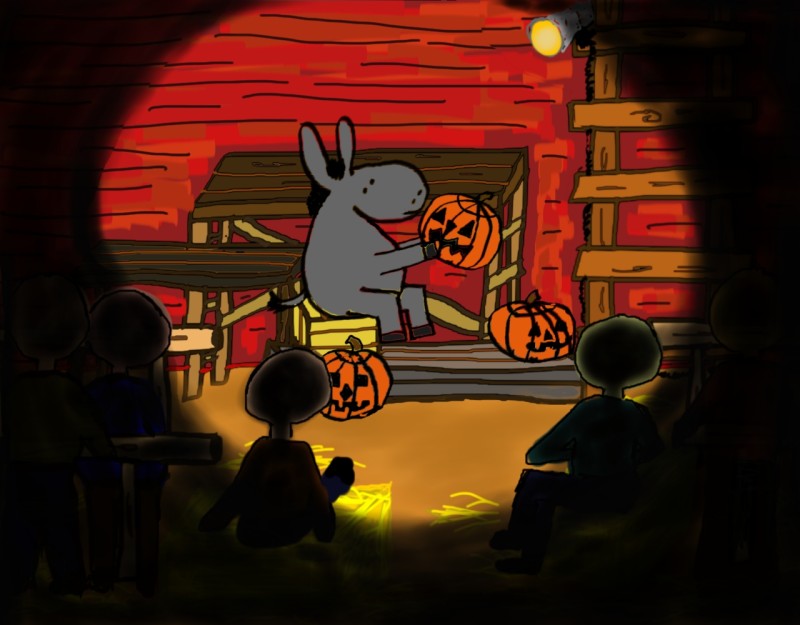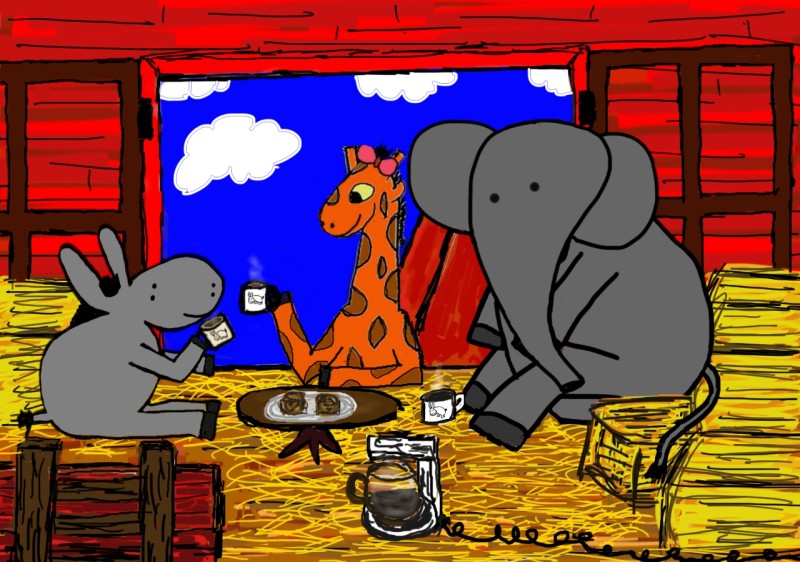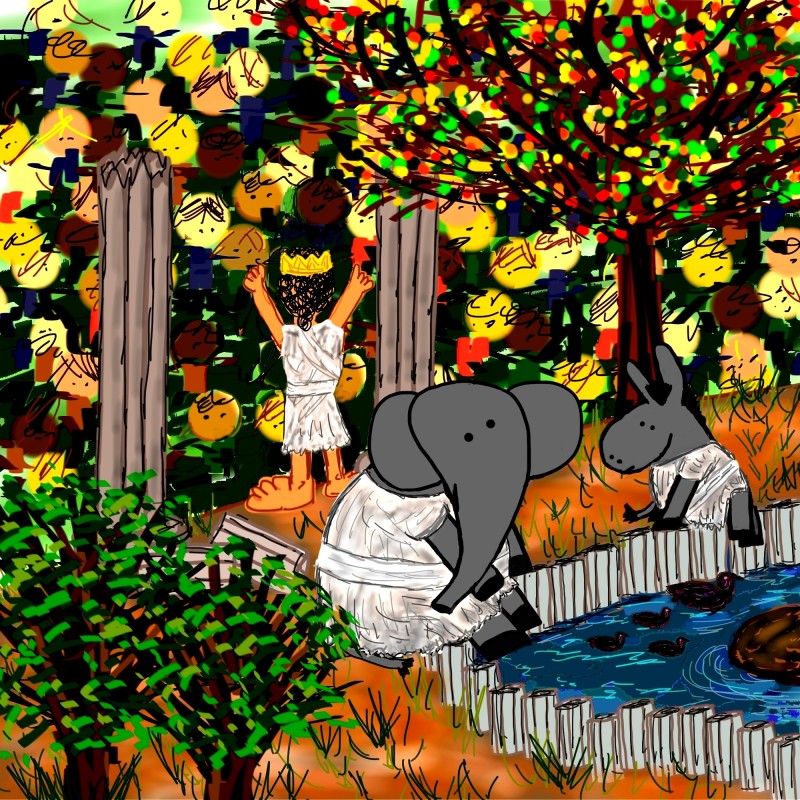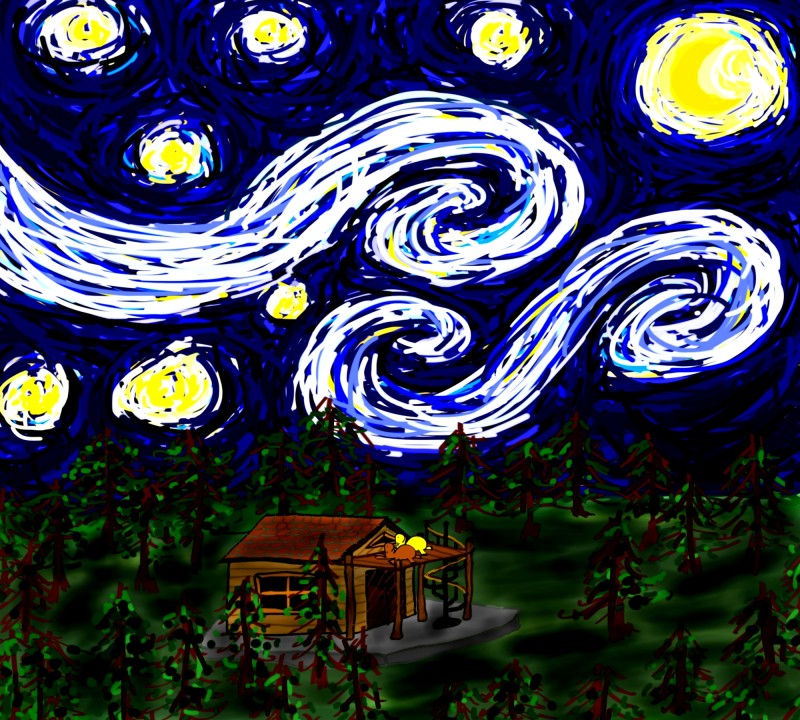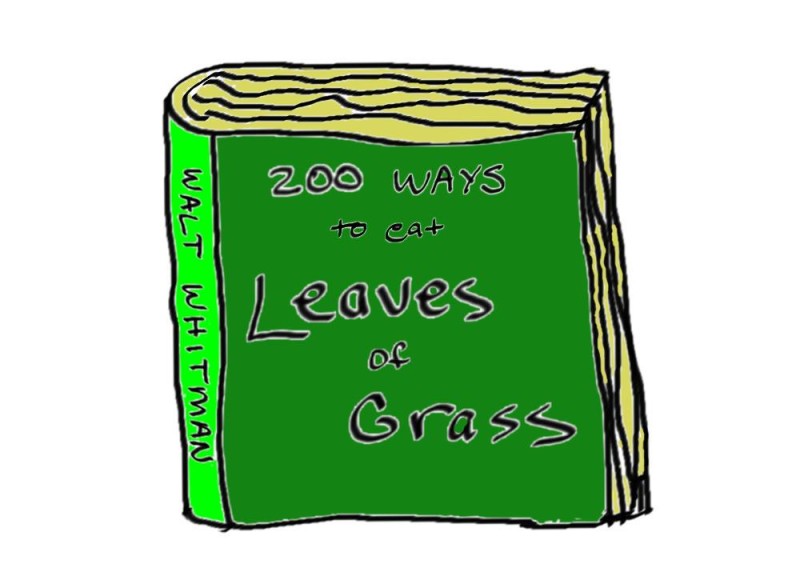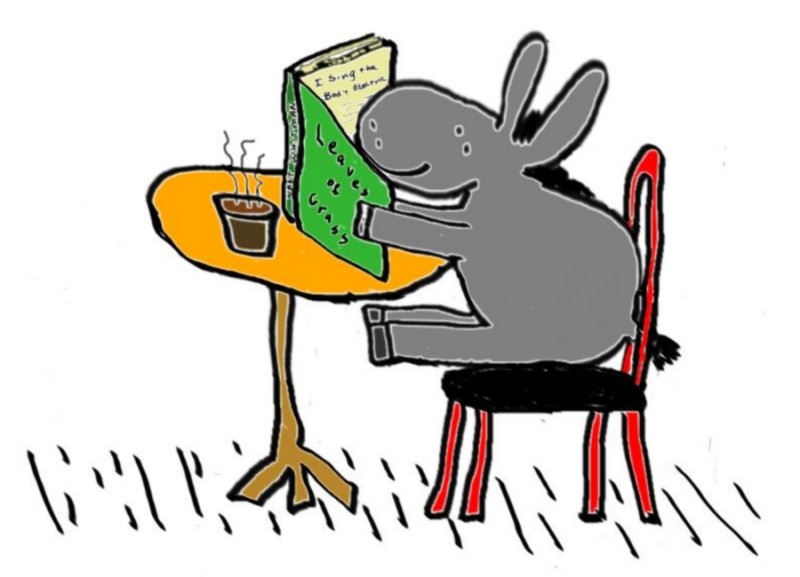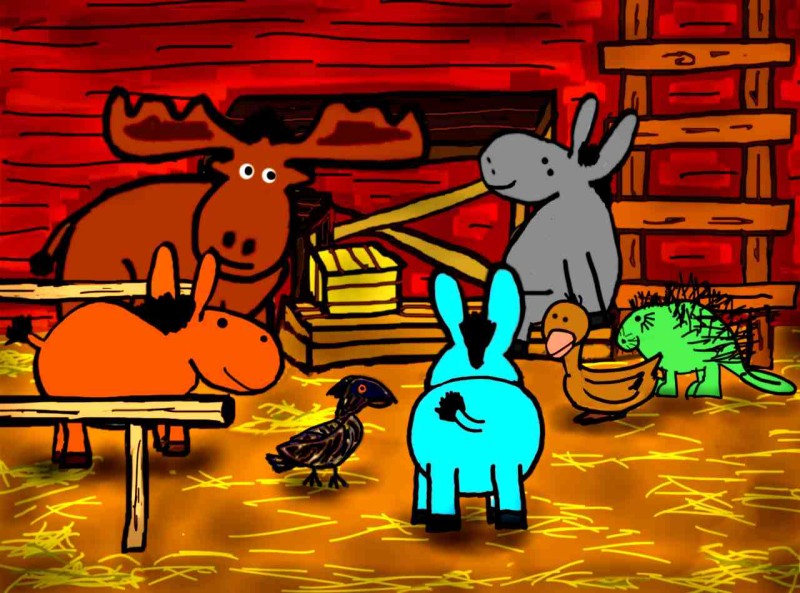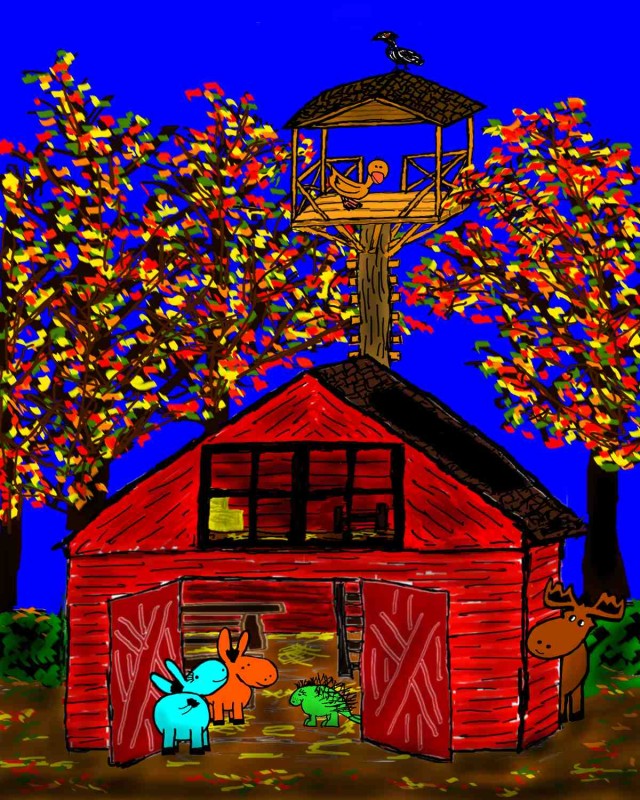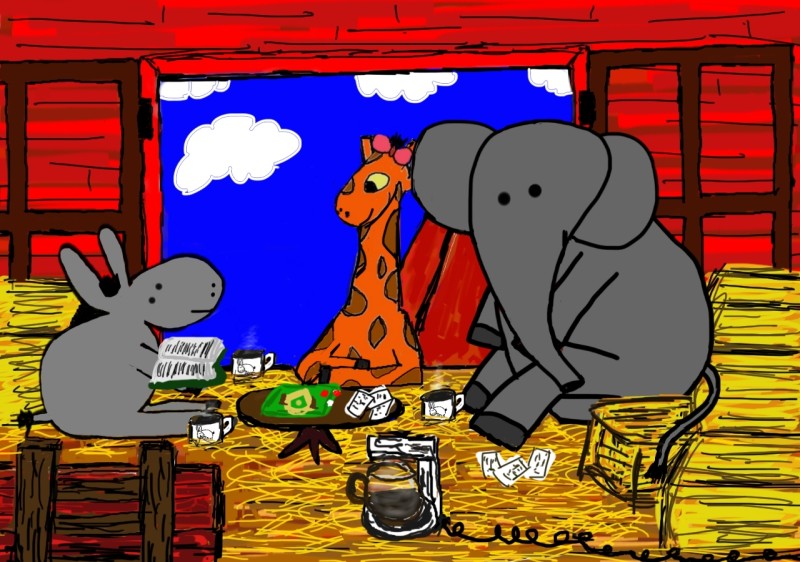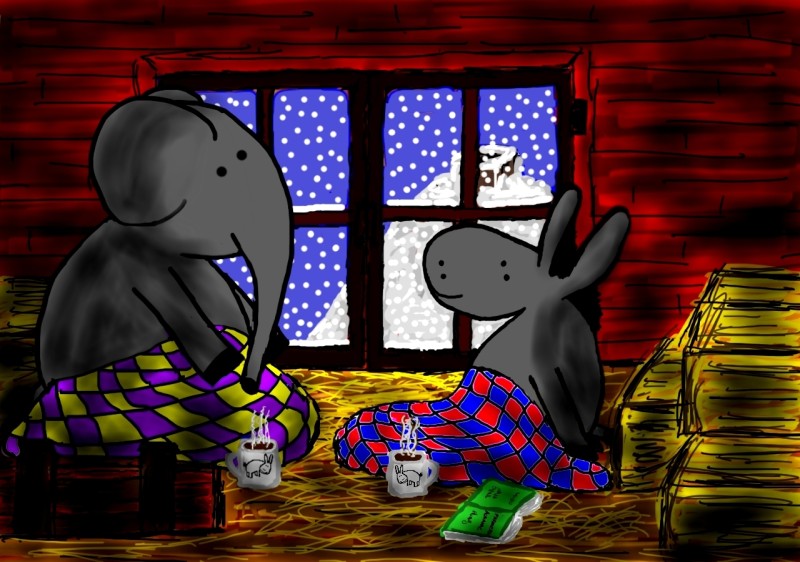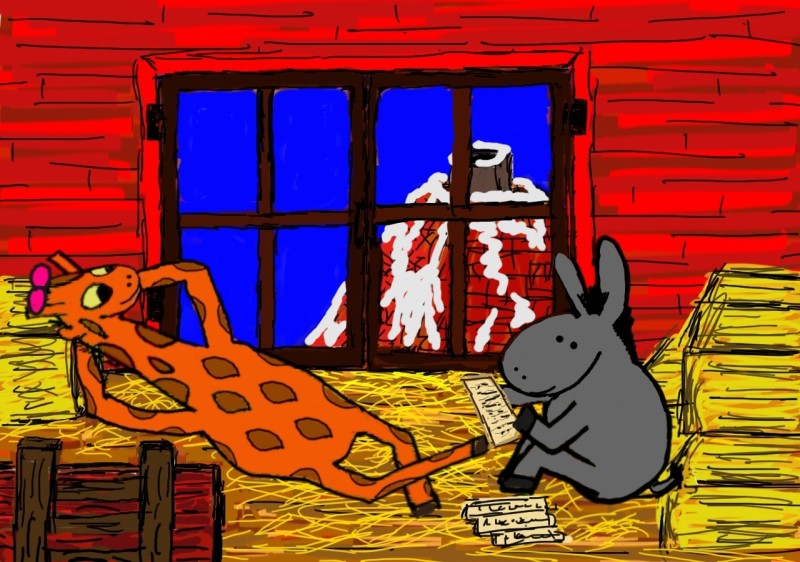Alas, poor Yorick, an excellent pie did he make.
Tag: analysis
“Blurtso speaks Greek” (III)
“Bonny and Pablo look at the stars” (IV)
“Blurtso gets a gift”
“Weohryant University” (XXII) – What 101
The question for today’s class, said Blurtso, is: “What is the difference between sympathy and empathy?”
Sympathy and empathy? said Morton.
“Sympathy,” said Glouster, “is a relationship between persons or things wherein whatever affects one similarly affects the other.”
And empathy? said Chelsea.
“Empathy,” said Glouster, “is the capacity for experiencing as one’s own the feelings of another.”
That sounds like the same thing, said Frank.
Both words, said Glouster, come from the Greek word, “pathos,” meaning, “suffering, emotion, passion.” In Greek “sym” means “with” and “em” means “in.” So sympathy is “suffering with” another, while empathy is “suffering in” another.
I still don’t understand, said Morton.
Isn’t that the same as compassion? said Emma Lou.
“Compassion,” said Glouster, is “sorrow or pity aroused by the suffering of another.” It is derived from the Latin words “com” or “with” and “passion” or “suffering.”
So “compassion,” said Emma Lou, is the Latin equivalent of the Greek word “sympathy.”
Exactly, said Glouster.
That still doesn’t tell me, said Morton, the difference between sympathy and empathy.
Both words, said Glouster, imply a relationship, or “oneness” between the subject and object, between the “sympathizer” and the other.
Just like in the Upanishads, said Emma Lou, and the Tao Te Ching. Both books talk about the oneness of all things, that separation is just an illusion.
The gospel of Matthew, said Glouster, says “love your enemies.”
Does it say you and your enemies are one? said Emma Lou.
Not exactly, said Glouster, but it goes on to say, “I tell you, whatever you did for one of the least of these brothers and sisters of mine, you did for me.”
That’s pretty much the same thing, said Chelsea.
The gospel of John, said Glouster, says, “do unto others as you would have them do unto you.”
Isn’t that compassion? said Chelsea.
“Compassion,” said Emma Lou, is feeling someone else’s pain as your own. The way to do that is not to see others as separate from you.
One hundred fourteen of the one hundred fifteen verses of the Quran, said Frank, begin with “In the name of Allah the compassionate, the merciful…”
Ommmm, said moose.
What? said Glouster.
I think he said “Ommmm,” said Frank.
Ommmm (phonetically “aum”), said Emma Lou, is from the Upanishads, it is the monosyllable which contains all syllables and all sounds. It represents the oneness underlying multiplicity—the non-duality of “Brahman” beneath the dualism and illusion of “Maya.”
The illusion of Maya? said Morton.
The illusion that we are not all one, said Emma Lou.
So compassion, said Frank, is recognizing—beyond the illusion of separation—that we are all one?
Exactly, said Emma Lou.
I still don’t understand, said Morton, the difference between sympathy and empathy.
Think of it this way, said Glouster. When someone is suffering because of a specific situation, but you have not experienced that situation yourself, you can only sympathize with them, but if you have experienced that same situation, you can empathize.
That’s very confusing, said Chelsea.
Yes, said Morton, I feel exactly the same way.
“Weohryant University” (XX)
Do you think we’re early? said Morton.
I don’t want to appear anxious, said Emma Lou.
Neither do I, said Chelsea.
How long should we wait? said Morton.
Until it’s time, said Emma Lou.
How will we know? said Morton.
They’ll tell us, said Emma Lou.
What if they don’t? said Morton.
Then we’ll never know, said Chelsea.
They’ll tell us, said Emma Lou, if they want us to know.
And if they don’t? said Morton.
Then they won’t tell us, said Emma Lou.
That makes sense, said Chelsea.
Where are the others? said Morton.
They’re waiting for us to decide, said Chelsea.
They don’t want to appear anxious, said Emma Lou.
What’s wrong with appearing anxious? said Morton.
It makes you look greedy, said Emma Lou.
Even if you’re willing to share? said Morton.
Maybe they want us to wait, said Chelsea.
Why? said Morton.
Because anticipation increases desire, said Emma Lou.
Yes, said Chelsea, like in the Kama Sutra.
The Kama Sutra? said Morton.
The Kama Sutra, said Chelsea, is one of the books on our reading list.
The one the moose keeps hogging? said Morton.
Yes, said Chelsea, but I managed to sneak a peak.
What does it say? said Morton.
It says that withholding pleasure increases desire, and increasing desire increases pleasure.
What if you don’t get what you desire? said Morton.
Then you still get the pleasure of anticipating, said Chelsea.
The pleasure of anticipating? said Morton.
Yes, said Chelsea, like when you spend the winter anticipating the spring fashions, and when the fashions come out, you’re a little disappointed, but at least you had the pleasure of anticipating them.
That happens for me, said Emma Lou, every season of the year.
But sometimes when you get something, said Morton, it’s as good as what you had hoped for.
That’s true, said Chelsea, but getting it doesn’t diminish the pleasure you got from anticipating it.
It teaches you, said Emma Lou, to enjoy the journey and not focus on the destination.
The destination? said Morton.
The object of desire, said Emma Lou.
We’ve waited long enough, said Morton.
You may be right, said Emma Lou.
I wonder if the others are enjoying the wait? said Chelsea.
Birds can be very patient, said Emma Lou.
That’s true, said Morton, I watched Frank sit on a fence for five hours yesterday.
You watched him for five hours? said Chelsea.
Yes, said Morton.
And you didn’t get impatient? said Chelsea.
No, said Morton, I didn’t want to eat him.
So you’re only impatient, said Emma Lou, with things you want to consume?
Yes, said Morton.
What if you’re not hungry? said Emma Lou.
There are some things I want to consume, said Morton, whether I’m hungry or not.
That’s not very healthy, said Emma Lou.
I know, said Morton.
Do you smell that? said Chelsea.
Yes, said Emma Lou, I do.
It must be time, said Chelsea.
Yes, said Emma Lou, it must be time.
Really? said Morton, I was just starting to enjoy the anticipation.
“Alex takes her friends to the street” (IX)
What’s this? said Blurtso. It’s the Baseball Encyclopedia, said Alex, the complete statistical record of every man to ever play Major League Baseball. Wow, said Blurtso, it’s like a history book written with numbers instead of letters. Exactly, said Alex. Who is the greatest player of all time? said Blurtso. Babe Ruth, said Alex. Or Ted Williams, said Harlan. Which one is it? said Blurtso. Babe Ruth, said Alex, hit 714 homeruns, a record which lasted for forty years. Yes, said Harlan, but Ted Williams hit 521 homeruns, and he missed five seasons due to military service. So? said Alex. If he had played those years, said Harlan, and averaged 36 homeruns per year, which is what he averaged for his career, he would have hit 700 homeruns as well. Who had the higher batting average? said Blurtso. Babe Ruth batted .342, said Alex. Ted Williams batted .344, said Harlan. Who was a better defensive player? said Blurtso. Babe Ruth, said Alex, until he got fat. Has anyone else hit 700 homeruns? said Blurtso. Yes, said Alex, Barry Bonds and Hank Aaron. Willie Mays hit 660, said Harlan, and he missed two years in the military, so he would have hit 700. Who is the best defensive player in that group? said Blurtso. Willie Mays, said Alex, but Barry Bonds was also exceptional. Better than Babe Ruth? said Blurtso. Much better, said Harlan. Then why, said Blurtso, isn’t Barry Bonds the best player ever? Because, said Alex, he played in the steroids era. Who was the greatest all-around player, offense and defense? said Blurtso. Probably Willie Mays, said Alex. Or Barry Bonds, said Harlan. But Babe Ruth, said Alex, is the greatest player of all time. Or Ted Williams, said Harlan.
“Blurtso becomes an axolotl”
I read the strangest story in my in my literature class, said Harlan. What was it about? said Blurtso. It was about an aquarium of axolotls, said Harlan. What’s an axolotl? said Blurtso. An axolotl is an ancient, tadpole-like creature. What happened in the story? said Blurtso. Nothing, said Harlan, the axolotls just sat around on the bottom of the aquarium looking through the glass. What a great story, said Blurtso.
“Graham Cracker Crumbs” (II)
What’s that you’ve been writing? said Alex. It’s a collection of poems, said Blurtso. A collection? said Alex. Yes, said Blurtso, for Lizzy. I’m calling it, Graham Cracker Crumbs. Why? said Alex. Because when I see her pass, said Blurtso, and then she’s gone, I feel as empty as an empty pie tin. Oh, said Alex, and the poems are the crumbs that remain? Yes, said Blurtso, the remnants of my lost rapture. Can I hear one? said Alex. Sure, said Blurtso, this is about the time I saw her limping across campus. I call it, “O my love limps so!”
“O my love limps so!
“The birds were sweetly chirping
and the grass was growing green,
as I waited on my bench
for the jenny of my dreams.
While the shadows slowly passed,
not a vision did I spy,
‘til suddenly across the grass,
a limping caught my eye.
My love is sorely stricken,
she’s suff’ring and distressed!
Her left rear hoof is lagging,
is lagging behind the rest!
Oh lovely injured unguis!
Oh tender cloven pes!
Of late so sweet enticing,
now dragging on the grass.
Oh ass! Oh hoof! Oh ankle
so twisted and exposed!
The pain that’s in your heel
pricks the loving heart that knows!
That’s very good, said Alex, but what’s an “unguis”? “Unguis,” said Blurtso, is the Latin word for hoof. What about “pes”? said Alex. “Pes” is the Latin word for foot. Oh, said Alex, I guess Latin’s not very poetic. No, said Blurtso, I guess not.
